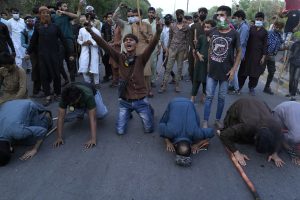Former Pakistani Ambassador to the U.S. Husain Haqqani told CNN’s Christiane Amanpour recently that former Pakistani Prime Minister Imran Khan, who heads the opposition Pakistan Tehreek-e-Insaaf, has been preparing his supporters for a violent revolt against the state by portraying his political battle as a fight between good and evil.
Haqqani said that Khan’s followers have engaged in violence that Pakistan has never seen in support of major political parties before. “Imran Khan is popular, but the question is, does that popularity reach the point where he and his supporters can overwhelm everybody else and not play by any rules?” Haqqani asked. According to Haqqani, it is time to find out if Khan can replace Iran’s late leader and founder of the Islamic Republic, Ayatollah Khomeini, as Pakistan’s equivalent through a violent revolution.
Ayatollah Khomeini was a hugely influential figure in world politics, religion and revolution. He is best known for his role in leading the Iranian Revolution, which overthrew the Pahlavi dynasty in 1979 and established the Islamic Republic in its place. Irrespective of the merits and demerits of his struggle, Khomeini’s principled and uncompromising stance on various political and religious issues made him a revered leader in Iran and across the Middle East. He also championed a strict interpretation of Islamic law, leading to his reputation as a hardliner among religious leaders. Khomeini’s efforts to transform Iran into an Islamic state had far-reaching implications for both domestic and international politics.
However, Khan’s lack of a principled stance on issues has left many questioning his true intentions. This lack of commitment to any specific ideology or policy platform raises doubts about whether he truly cares about the welfare of Pakistanis or is merely exploiting them for personal gain.
Unlike Iran’s Khomeini, Khan is neither a revolutionary nor is he seeking to overthrow established institutions as part of his so-called righteous struggle against a system that he claims is beholden to the West. In fact, Khan’s comparison to Iran’s Khomeini is baseless as the former’s struggle has been for power only and not for any revolution or civilian supremacy. Khan has not been fighting against an oppressive regime, nor has he been advocating for any kind of change in the country’s political system. Rather, he has been using his charisma and popularity to build a political base of devotees that can help him return to power.
During his year-long campaign to divide a deeply polarized Pakistan, Khan proved that he was nothing but a hypocrite, ready to exploit the hopes of millions of young Pakistanis. Since being ousted from power last year, Khan has resorted to using dirty political games to bully his opponents into submission at the cost of Pakistan’s stability. He has been hiding behind threats of revolution and righteousness in an effort to win back the support of the establishment.
It is clear that Khan is only angry that the establishment no longer likes him or finds him useful. He is using these tactics as a way to regain their favor and manipulate them into giving him power once again.
Khan had previously claimed that the U.S. had ousted him from power and that he would not seek any help from Washington. Currently, Khan is making attempts to convince his followers that the conspiracy to remove him from power was indigenous and that Washington was duped by the Pakistani security establishment into following this conspiracy. It appears that he is trying to build bridges with Washington through lobbyist groups in an effort to save his political future.
Despite Khan’s pleas for statements in support of his party, the U.S. government has remained silent as it doesn’t appear to be willing to sacrifice its ties with the establishment for a political leader responsible for rising anti-Americanism and instability in Pakistan.
Unlike Iran’s Khomeini, who spent more than a year in prison and a decade in exile, Khan has made it clear that he will neither go to prison nor will he answer for crimes committed when his party was in power. Following his arrest, the violent protests and attacks on military installations were not part of any revolution, but an effort to tell the state that Khan should be left alone.
Now, that his support base has vanished after the state’s crackdown, Khan is telling Pakistan’s powerful generals that he is willing to negotiate and doesn’t want to interfere in their affairs. He is now condemning his own supporters whom he prepared for months for an aimless and nameless revolution.
Khan has quite cleverly used religion and anti-Western narratives to exploit young Pakistanis. His use of a variety of narratives to fight his battle, such as calling his political rivals “evils,” using religion in his speeches to give an “Islamic touch” to his movement, and telling Pakistanis that other political parties want them to become “slaves” of the West has enabled him to gain support from the youth.
While Khan talks about the continuity of policy and building institutions, he is the one who reneged on the International Monetary Fund (IMF)’s deal to build a trap for the incumbent government. The trap he set up to derail the IMF deal has cost Pakistan dearly as the country has not been able to revive the stalled program even after making massive concessions.
In power, Khan had his chance of emerging as a leader who could rival others in the neighborhood and beyond by delivering through good governance. Sadly, he preferred politics and destabilization even while in power.
There is nobody in Pakistan’s system who is willing to trust Khan anymore. Rather, they see him as a threat to the country’s stability.
Now that the Pakistani state has decided to declare May 9 a “Black Day” to protest against PTI’s violent protests and ransacking of army installations, it is doubtful if Khan can ever return to the helm of affairs in the foreseeable future.

































